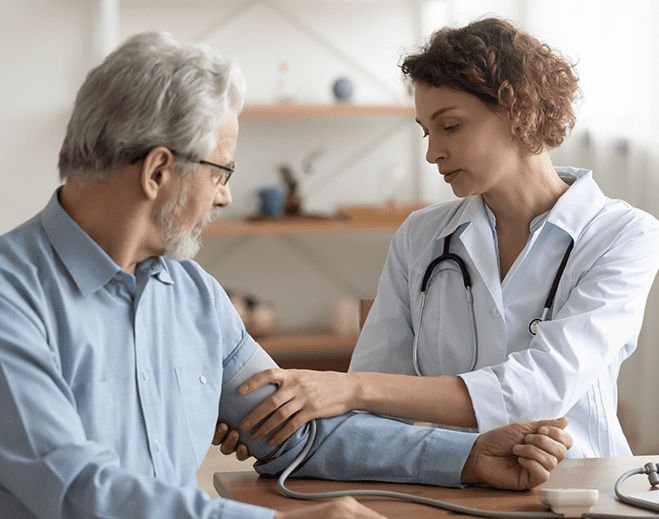Heart Surgery
When lifestyle changes and medications are not enough to correct problems with your heart, a cardiologist in San Ramon may recommend heart surgery.
Request a Cardiologist Referral
Less Invasive Heart Procedures for Better Outcomes
San Ramon Regional Medical Center is committed to helping you enjoy life with a healthier heart. Our cardiovascular surgeons perform various heart or cardiac surgeries, focusing on minimally invasive procedures using advanced technology and time-tested techniques. Additionally, you can rely on our nurses, technologists and administrative staff for guidance and support from the day you first reach out to us through recovery.
Some of the heart procedures we offer include, but are not limited to, the following:
- Coronary artery bypass
- Heart valve repairs and replacements
- Aneurysm repairs
- Carotid endarterectomy
- Restoration of a narrowing of the aortic valve opening
What Is Heart Surgery?
Heart surgery or cardiac surgery is a procedure performed to correct heart problems. A cardiologist in San Ramon may recommend specific cardiac surgery procedures if other treatment options, such as lifestyle changes or other medical procedures and medications are not enough to correct the problem with your heart.
Heart surgery helps fix heart valves that don’t work well. It also helps control abnormal heart rhythms, implant medical devices to help the heart function properly, replace a damaged heart with a healthy one and treat heart failure or coronary heart disease (CHD).
What Conditions May Need a Heart Surgery?
Some of the conditions that may require heart surgery are as follows:
- Aneurysm
- Angina
- Arrhythmia
- CHD
- Heart attack
- Heart failure
- Heart valves that don’t work well
Advanced Heart Surgery Techniques
Our cardiovascular surgeons in San Ramon use advanced techniques for various cardiac surgery procedures, such as the following:
-
Off-Pump/Beating Method:
Our surgeons have adopted the off-pump or beating heart method for cardiac bypass surgery. By performing the bypass without stopping the heart and without using a heart/lung machine, patients generally experience fewer complications and a decreased risk of stroke.
-
Endoscopic Vein Harvesting:
Surgeons remove healthy blood vessels with a minimally invasive technique during cardiac bypass surgery. They harvest vessels with an endoscope through tiny incisions in the leg rather than a full-leg incision, helping decrease the risk of damages in the muscle and tissue. Patients may also experience less pain and scarring, lower risk for infection and shorter recovery times.
-
Mitral Valve Repair:
Our surgeons usually rebuild leaky valves while avoiding anticoagulants like Coumadin. Artificial valve replacements require a lifetime of anticoagulants.
-
MAZE Procedures for Atrial Fibrillation:
This procedure redirects the erratic electrical impulses that cause an irregular heart rhythm.
How to Prepare for Your Heart Surgery
The way you prepare for your surgery may vary based on the type of heart surgery you will have. Some are emergency heart surgeries, while others are planned surgeries. If you have a scheduled surgery, the doctor will explain what will happen and how you can prepare. You may need to undergo tests and screenings, such as blood tests, an electrocardiogram (EKG), a stress test or a chest X-ray to determine if you are fit for surgery.
Once you have a date for your surgery, your doctor may recommend that you avoid certain foods, medications and other lifestyle changes to minimize potential risks. You may need to come to the hospital a few minutes or hours before your schedule to fill out some documents or address your questions.
What to Expect During Your Heart Surgery
Heart surgery is often done in a hospital, performed by a team of experts comprised of cardiovascular surgeons, anesthesiologists and surgical nurses. When you’re in the operating room, you may receive medicine so you can fall asleep and not feel pain during the surgery.
How Long Will a Heart Surgery Take?
It may depend on the surgery you’re having. Coronary artery bypass graft (CABG), the most common type of heart surgery, usually takes about 3-6 hours to finish.
What to Expect After Your Heart Surgery
You may need to stay in the hospital for several days, depending on the type of heart surgery. The healthcare team may give you an oxygen face mask or nasal prongs if you need them. You may also rely on an intravenous (IV) needle in your arm or chest for fluids until you can drink on your own. Doctors and nurses will closely monitor your blood pressure, breathing, heart rate and incision sites for several days to detect if there are complications or if you’re ready to go home.
Before going home, your doctor will instruct you how to take care of your incision(s), take certain medications, recognize signs of infection or complications and schedule follow-up appointments. Your doctor may also tell you how to cope with the surgery’s potential after-effects, such as sleeping problems, constipation, loss of appetite, mood swings and depression.
Recovery time may vary depending on the severity and type of surgery you had. Your cardiologist in San Ramon will tell you when you can go back to your usual routine, including going to work, exercising, driving and other physical activities. You may also find support and assistance through our cardiac rehabilitation services.
Our Heart Surgery Best Practices
San Ramon Regional Medical Center uses standardized best practices based on medical evidence and designed to improve your heart surgery results. These include the following:
-
Minimize blood loss and the use of blood products:
As a hospital with a blood conservation program, we use surgical techniques to reduce blood loss in surgeries.
-
Improve neurological outcomes:
We are proud of our low stroke record.
-
Reduce noncardiac complications:
We strive to reduce pulmonary infections, sternal infections and renal failure.
-
Enhance recovery:
Our cardiology team removes respiratory tubes from most patients in about 5 hours after surgery. We encourage patients to get out of bed and walk to build their strength, helping them resist infections and recover faster.





